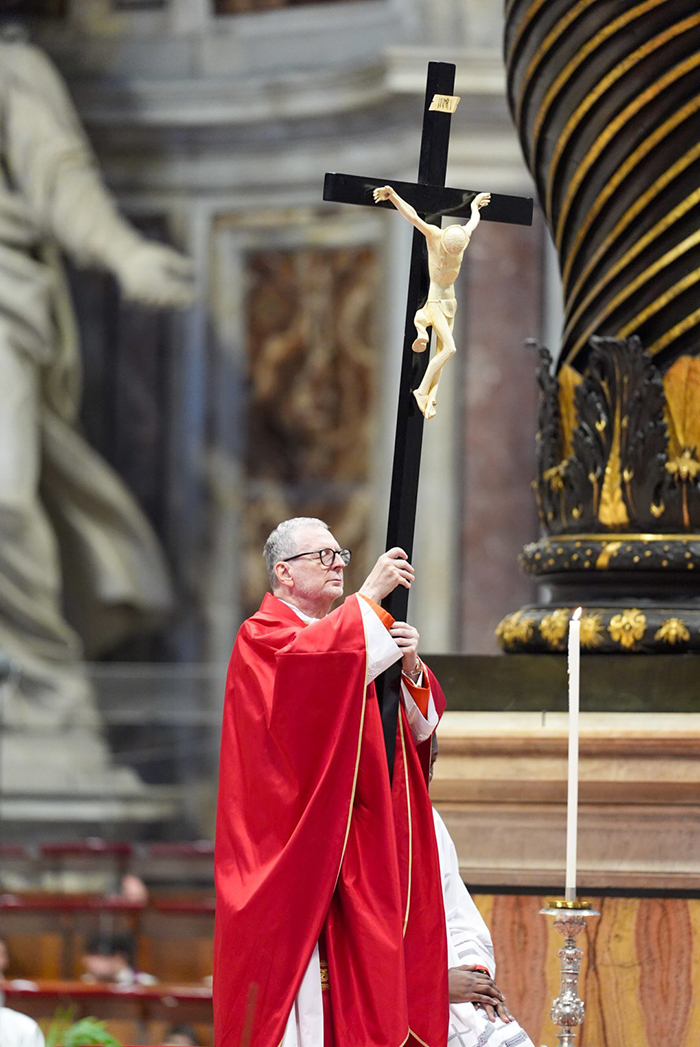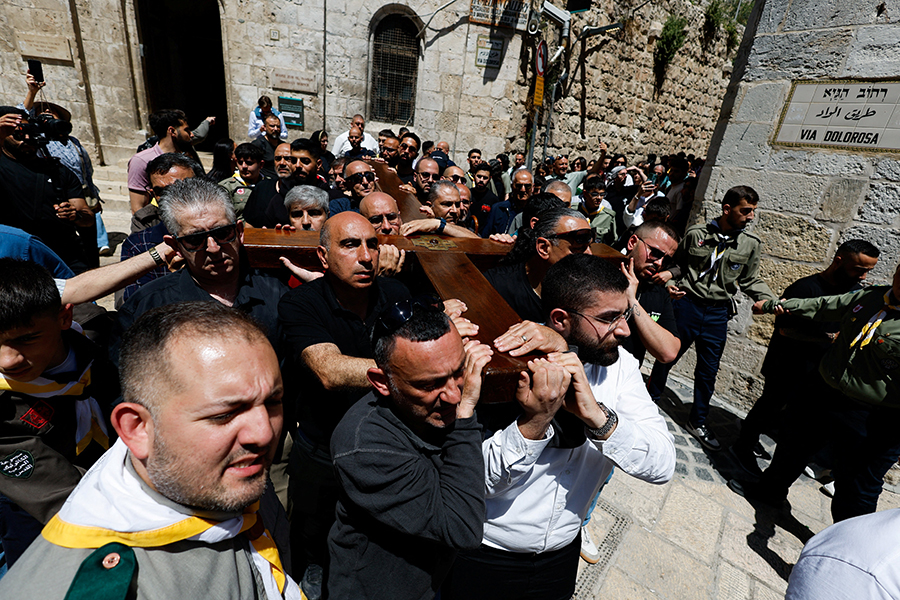
VATICAN CITY — Jesus, who redeemed humanity by giving up his life on the cross, shows that it is not strength that saves the world, but the "weakness" of boundless love, the papal preacher told thousands of people gathered for the Liturgy of the Lord's Passion, including U.S. Vice President JD Vance.
Today's world, which is "marked by the myth of performance and seduced by the idol of individualism, struggles to recognize moments of defeat or passivity as possible places of fulfillment," Capuchin Father Roberto Pasolini, preacher of the papal household, said in his homily April 18 in St. Peter's Basilica.
The Good Friday service, which commemorates Christ's passion and death on the cross, was presided over by Cardinal Claudio Gugerotti, prefect of the Dicastery for Eastern Churches. But, following tradition, the homily was delivered by the preacher of the papal household.
Pope Francis, who was not present at the service, had asked different cardinals to lead the different liturgical events over Holy Week and Easter as he continues to recover from double pneumonia and a lengthy hospitalization.
Vance, who converted to Catholicism in 2019, attended the liturgy with his wife, Usha, a practicing Hindu, and his three children after meeting with Italian Prime Minister Giorgia Meloni earlier in the day. He was in Rome for private talks with Italian and Vatican officials; he was scheduled to meet with Cardinal Pietro Parolin, Vatican secretary of state, April 19.
In a post on X April 18 before the liturgy, the vice president said, "I'm grateful every day for this job, but particularly today where my official duties have brought me to Rome on Good Friday."
"I had a great meeting with Prime Minister Meloni and her team, and will head to church soon with my family in this beautiful city. I wish all Christians all over the world, but particularly those back home in the US, a blessed Good Friday. He died so that we might live," Vance wrote.
In his homily, Father Pasolini said that Jesus, nailed to the cross and stripped of everything, "chooses to give us his life and his Spirit entirely. It is not a passive surrender, but an act of supreme freedom, accepting weakness as the place where love can become full."
"It is not autonomy or great feats that give meaning to life, but the ability to transform limitations into an opportunity for giving. With this gesture, Jesus reveals to us that it is not strength that saves the world, but the weakness of love that holds nothing back and surrenders itself," he said.
The priest explained the importance of contemplating and venerating the cross during the liturgy as an opportunity to renew one's trust "in the way God chose to save the world" and in recognizing the cross is "the only possible direction of our lives."
"We know well that our strength will not be sufficient to accomplish this journey, but the Holy Spirit, who has already filled our hearts with sweet hope, will come to the aid of our weakness to remind us of the most important thing: Just as we have been loved, so we will be able to love -- friends and even enemies," he said.
"When pain, fatigue, loneliness or fear lay us bare, we are all tempted to shut down, to stiffen up, to feign self-sufficiency," he said. Yet it is during those moments that the truest love becomes possible, when one does not impose oneself, but allows oneself to be helped.
"Asking for what we need, and allowing others to offer it to us, is perhaps one of the highest and most humble forms of love," Father Pasolini said.
"To do so, we need only to abandon all pride, but also all illusions that we can save ourselves with our own strength. And to recognize that we cannot, and, above all, do not want to live all on our own," he said.
— Carol Glatz, Catholic News Service
Pictured at top: Cardinal Claudio Gugerotti, prefect of the Dicastery for Eastern Churches, kisses the crucifix during the Good Friday Liturgy of the Lord's Passion in St. Peter's Basilica at the Vatican April 18, 2025. (CNS/Lola Gomez)
Changing the world demands changing direction, pope writes for Way of Cross
-
 Men carry a large wooden cross during a Good Friday procession in Jerusalem's Old City April 18, 2023, along the Via Dolorosa, "The Way of Sorrow," the path believed to have been taken by Jesus to his crucifixion. (OSV News /Ammar Awad, Reuters)
Men carry a large wooden cross during a Good Friday procession in Jerusalem's Old City April 18, 2023, along the Via Dolorosa, "The Way of Sorrow," the path believed to have been taken by Jesus to his crucifixion. (OSV News /Ammar Awad, Reuters)Changing the world demands changing direction, pope writes for Way of Cross
ROME — Today's "builders of Babel" are constructing a hell on earth, rejecting everyone they decide are "losers," Pope Francis wrote in the meditations for the Way of the Cross.
"Your way, Jesus, is the way of the Beatitudes. It does not crush, but cultivates, repairs and protects," the pope wrote for the nighttime ceremony April 18 in Rome's Colosseum.
"Today's builders of Babel tell us that there is no room for losers, and that those who fall along the way are losers. Theirs is the construction site of hell," he wrote. "God's economy, on the other hand, does not kill, discard or crush. It is lowly, faithful to the earth."
Each year, the pope usually chooses a different person or group of people to write the series of prayers and reflections that are read aloud for each of the 14 stations, which commemorate Christ's condemnation, his carrying the cross to Golgotha, his crucifixion and his burial. However, the pope himself wrote the commentaries and prayers for the Holy Year this year like he did for last year's Year of Prayer.
For the third year in a row, Pope Francis was scheduled to follow the nighttime Way of the Cross service from his Vatican residence for health reasons as an expected 25,000 people gathered outside the ancient amphitheater.
Cardinal Baldassare Reina, papal vicar of Rome, was designated to fill in for the pope, presiding over the Good Friday ceremony and offering the final blessing at the end. Representatives of different groups were to take turns carrying a bare wooden cross, including: migrants, young people, people with disabilities, volunteers, charity workers, educators and members of "Ordo Viduarum," a group of widows who serve the church.
The pope's commentaries and prayers this year looked at how "the road to Calvary passes through the streets we tread each day."
Jesus came to change the world and, "for us, that means changing direction, seeing the goodness of your path, letting the memory of your glance transform our hearts," he wrote in his introduction.
"We need only hear his invitation: 'Come! Follow me!' And trust in that gaze of love," and from there "everything blossoms anew," he wrote, and places torn by conflict can move toward reconciliation, and "a heart of stone can turn into a heart of flesh."
For the first station, "Jesus is condemned to death," the pope highlighted how Jesus respects human freedom and trusts everyone by placing himself "in our hands."
Pilate could have freed Jesus, but "he chose not to," the pope wrote, asking the faithful to reflect on how "we have been prisoners of the roles we choose to continue playing, fearful of the challenge of a change in the direction of our lives."
"We can learn marvelous lessons from this: how to free those unjustly accused, how to acknowledge the complexity of situations, how to protest lethal judgments," the pope wrote, because it is Jesus who is "silently standing before us, in every one of our sisters and brothers exposed to judgment and bigotry."
"Religious disputes, legal quibbles, the so-called common sense that keeps us from getting involved in the fate of others: a thousand reasons drag us to the side of Herod, the priests, Pilate and the crowd. Yet, it could be otherwise," he wrote.
For the second station, "Jesus carries his cross," the pope wrote that the bigger burden is trying to avoid the cross and evade responsibility.
"All we need to do," he wrote, "is to stop running away and to remain in the company of those you have given us, to bind ourselves to them, recognizing that only in this way can we stop being prisoners of ourselves."
"Selfishness burdens us more than the cross. Indifference burdens us more than sharing," the pope wrote.
For the seventh station, "Jesus falls the second time," the pope underlined how Jesus was not afraid to stumble and fall.
"All those who are embarrassed by this, those who want to appear infallible, who hide their own falls yet refuse to pardon those of others, reject the path that you chose," he wrote.
"In you, all of us were found and brought home, like the one sheep that had gone astray," his meditation said.
"An economy in which the ninety-nine are more important than the one is inhumane. Yet we have built a world that works like that: a world of calculation and algorithms, of cold logic and implacable interests," he wrote.
However, he wrote, "when we turn our hearts to you, who fall and rise again, we experience a change of course and a change of pace. A conversion that restores our joy and brings us safely home."
In his prayer for the 11th station, "Jesus is nailed to the cross," the pope asked that people pray to God to "teach us to love" when "we are bound by unjust laws or decisions," when "we are at odds with those uninterested in truth and justice, and when everyone says, "There is nothing to be done."
— Carol Glatz, Catholic News Service



